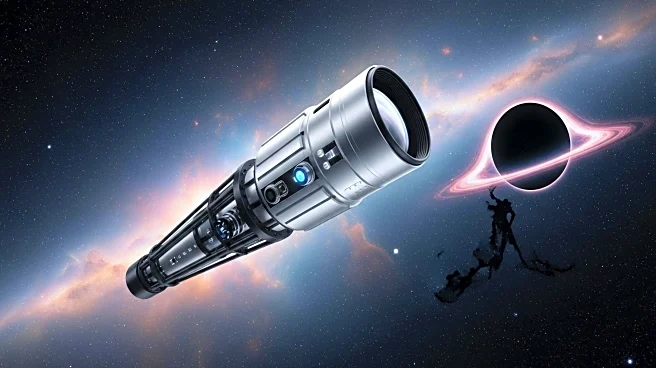What is the story about?
What's Happening?
The James Webb Space Telescope has identified a black hole that may have been formed in the first moments after the big bang, potentially confirming the existence of primordial black holes. This discovery challenges the prevailing cosmological theories that suggest stars and galaxies formed first, with black holes emerging later from collapsing stars. The black hole, referred to as QSO1, is characterized by a sparse halo of material and dates back over 13 billion years. The observations suggest that this black hole formed without a preceding galaxy, which contradicts current understanding. The findings, posted on the preprint Arxiv website, indicate that the black hole has a mass of 50 million solar masses, with surrounding material being less than half of this mass.
Why It's Important?
The identification of a primordial black hole could have significant implications for our understanding of the universe's formation and the fundamental laws of physics. If confirmed, this discovery would suggest that black holes were integral to the early structure of the cosmos, potentially acting as gravitational centers around which galaxies formed. This challenges the conventional sequence of cosmic evolution and could lead to a reevaluation of existing cosmological models. The presence of chemically pristine material around the black hole, consisting mainly of hydrogen and helium, further supports the notion of minimal star formation in its vicinity, reinforcing the primordial black hole hypothesis.
What's Next?
Future research and observations will be crucial in confirming the primordial nature of the black hole. The next generation of gravitational wave detectors, expected to be operational within a decade, will play a key role in resolving this debate by providing more direct evidence of primordial black holes across the universe. Continued analysis of the data from the James Webb Space Telescope and other observational tools will help refine our understanding of the conditions necessary for the formation of such black holes.
Beyond the Headlines
The potential confirmation of primordial black holes could lead to a paradigm shift in cosmology, influencing theories about the universe's early conditions and the role of black holes in cosmic evolution. This discovery may also impact the study of gravitational waves and the search for other exotic cosmic phenomena, prompting new lines of inquiry into the nature of the universe.

















